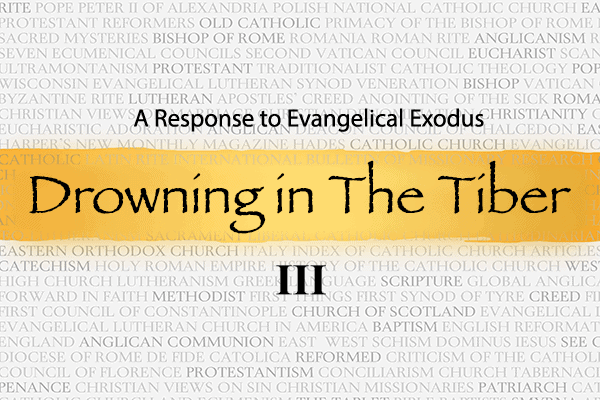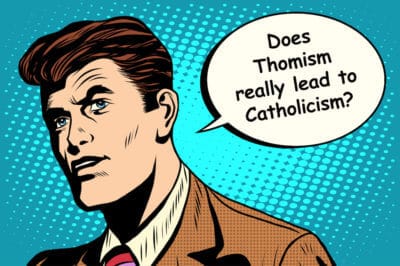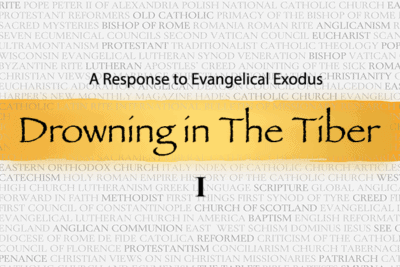Beaumont engages in a thought experiment:
I eventually asked myself, “If every Christian who had ever lived came back to life next Sunday and went to his respective church, where would I want to attend?” The Church of Ignatius, Ambrose, Jerome, Augustine, Anselm, Aquinas, Dante, J. R. R. Tolkien, G. K. Chesterton, John Henry Newman, Etienne Gilson, Mother Teresa, Flannery O’Connor, Francis Beckwith, Ed Feser, and Peter Kreeft sounded pretty good! How could all these great Christians throughout history—many who formed, expounded, lived, and defended so much of the Christian faith as we know it today—have gotten it as horribly wrong as Protestants believe they have? How could Catholicism have produced such a wealth of intellectually bright, morally upstanding, and spiritually illuminated Christians yet have gotten Christianity itself wrong? (Ibid., 46)
First of all, even if no one can explain how “. . . these great Christians throughout history . . . have gotten it as horribly wrong . . .”, it does not thereby prove or even imply that these “great Christians” got it right! Secondly, it is not at all astounding that individuals throughout history got something wrong. Reading the so called “great philosophers,” since Descartes (1596–1650) to Kant (1724–1804) to a multitude of modern philosophers, it becomes evident that throughout this portion of the history of philosophy they got it wrong. How can a group throughout history get it horribly wrong? They can all get it wrong by beginning with or presupposing notions that are wrong. As for the philosophers, they began with the assumption that somehow we must explain how the representation in the mind is or is not an accurate representation of something in the world.
Thirdly, Protestants can also list the names of great Christians throughout history: Martin Luther, John Calvin, John Preston, John Owens, Francis Turretin, James Barr, L. Berkhof, David Allen Black, Charles Ryrie, John Walvoord, Moisés Silva, John Sailhamer, D. A. Carson, Walter C. Kaiser, et al. How could these great Christians have gotten it horribly wrong? Beaumont asks, “How could Catholicism have produced such a wealth of intellectually bright, morally upstanding, and spiritually illuminated Christians yet have gotten Christianity itself wrong?” Has not Protestantism produced a wealth of intellectually bright, morally upstanding, and spiritually illuminated Christians? Why not trust these great Christians rather than the ones Beaumont lists? Beaumont is not willing to trust the Protestant scholars because he has already assumed that Catholicism is true. But truth is not determined by the number, character, or illumination of any individual or group. Truth is a quality predicated of propositions.
Earlier in his article, Beaumont makes the following claim: “Further, this Church was said to be unable to be overcome (Mt 16:18)” (Ibid., 34). This is expressed by Francis Sullivan. He begins his argument for the indefectibility of the church by expressing the following:
One of the fruits of the recent discussion on infallibility, both of that stimulated by Hans Küng’s critique of the official teaching on the subject, and of the ongoing ecumenical dialogue, most notably the Lutheran-Catholic dialogue in the United States, has been to focus attention on the basic and widely shared Christian belief in the indefectibility of the Church. For a great many Christians besides Roman Catholics, it is a matter of faith that the Church of Christ has a divine assurance of its remaining not only in existence, but also of its being maintained in fidelity to Christ and his Gospel, until the end of time. Indeed there is clear evidence that the New Testament Church shared such a belief. For even if we prescind from the question whether the historical Jesus said to Peter: ‘Upon this rock I shall build my church and the gates of hell shall not prevail against it’ (Mt 16:18), it is at least obvious that the evangelist could not have attributed this saying to Jesus unless the Christian community was persuaded that nothing could ever destroy his Church. Likewise, whether or not the risen Christ’s last words to his disciples were actually the last words of Matthew’s Gospel: ‘I am with you always, to the close of the age,’ there is no doubt that these words witness to the faith of the early Christian community that their risen Lord would never abandon them, and that his Church would enjoy his presence and assistance to the end of time. (Francis A. Sullivan, Magisterium: Teaching Authority in the Catholic Church [Eugene, Oregon: Wipf & Stock Publishers, 2008], 4.)
Leaving aside for the moment the controversial assumption that the rock was a reference to Peter, it is clear that Sullivan has not thought through the statement about the “gates of hell” not prevailing against the church. Sullivan takes this as indicating that “nothing could ever destroy his Church.” However, the fact that the statement refers to the gates (puvlai, pulai) of hell does not indicate that something or someone will attack the Church, for gates are defensive structures, not offensive weapons. Defensive structures do not attack. Rather, they are meant to repel attacks. Gates are designed to keep some out and others in. People need to be freed from bondage by the preaching of the Gospel. The gates of hell will not be able to resist the Church as it storms the place of bondage to release the captives. This parallels in many ways the release of the captives from Egypt. God’s man, Moses, came to lead the people out of the bondage to Pharaoh. In Ezekiel God declares that He is against Pharaoh: ““Speak and say, ‘Thus says the Lord God, “Behold, I am against you, Pharaoh king of Egypt, the great monster that lies in the midst of his rivers, that has said, ‘My Nile is mine, and I myself have made’”’” (Ezek. 29:3). In fact, the word translated “great monster” is actually the word ýyNIT’h’, which means “serpent.” The LXX uses the expression τὸν δράκοντα τὸν μέγαν (ton drakonta ton megan), which can be translated “the great serpent,” or “the great dragon.”. The beginning of the book of Exodus indicates that God knew His people by name: “Now these are the names of the sons of Israel who came to Egypt with Jacob; they came each one with his household: Reuben, Simeon, Levi and Judah; Issachar, Zebulun and Benjamin; Dan and Naphtali, Gad and Asher” (Ex. 1:1–4). So also, the man Jesus as a new and better Moses comes to the place of captivity, the stronghold of the Devil, the ruler of this world; “Now judgment is upon this world; now the ruler of this world will be cast out” (John. 12:31). Jesus comes to free the captives and overthrow the Devil. Also, Jesus knows His people by name: “But he who enters by the door is a shepherd of the sheep. To him the doorkeeper opens, and the sheep hear his voice, and he calls his own sheep by name and leads them out” (John. 10:2–3). Taken in this way, it offers no scriptural support for the indefectibility of the church. Now this is not to claim that the church is defectible. Rather, it seems to demonstrate that Matt. 16:18 does not support the claim that the church is indefectible.
Also, in order to get a better sense of the statements in Matt. 16:18, we must include a bit of the context.
Now when Jesus came into the district of Caesarea Philippi, He was asking His disciples, “Who do people say that the Son of Man is?” And they said, “Some John the Baptist; and others, Elijah; but still others, Jeremiah, or one of the prophets.” He says to them, “But who do you say that I am?” Simon Peter answered, “You are the Christ, the Son of the living God.” And Jesus said to him, “Blessed are you, Simon Barjona, because flesh and blood did not reveal to you, but My Father who is in heaven. I also say to you that you are Peter, and upon this rock I will build My church; and the gates of Hades will not have the capability to defeat it. I will give you the keys of the kingdom of heaven; and whatever you bind on earth shall have been bound in heaven, and whatever you loose on earth shall have been loosed in heaven” (Matt. 16:13-19).
No small amount of literature has been produced concerning the interpretation of the statement, “and upon this rock I will build My church.” The fact that the name ‘Peter’ (Petros) is masculine and the word ‘rock’ (petra) is feminine indicates that it is at least questionable to assume that the rock refers to Peter. Many have argued, I believe convincingly, that the rock is the confession that Peter made that Jesus is the Christ, the Son of the living God. Simply to assume that the rock is a reference to Peter is unjustified and must be accompanied by strong exegetical evidence—evidence that has been lacking even up to today.
Verse 19 seems to refer to Peter by the use of the singular personal pronoun ‘you’ (soi, lit. “to you”). However, if the keys to the kingdom were in fact given to Peter, this does not necessarily mean that Peter is the rock to which Jesus is referring. The events recorded in Acts seem to bear out the notion that the keys were given to Peter; (1) he was the first to preach the Gospel to the Jews at Pentecost; and (2) he was the first to present the Gospel to the Gentiles (Acts 10). Neither does this indicate that Peter’s task extended beyond these two events. Introducing the Gospel to the Jews first and then to the Gentiles was the extent of humanity, as Paul says, “For I am not ashamed of the gospel, for it is the power of God for salvation to everyone who believes, to the Jew first and also to the Greek” (Rom. 1:16). Here the term translated ‘Greek’ is used to refer to the Gentiles as indicated in BDAG (Arndt, William, Frederick W. Danker, and Walter Bauer. A Greek-English Lexicon of the New Testament and Other Early Christian Literature 3d ed. (Chicago: University of Chicago Press, 2000), s.v. “ Hellen.”). It cannot be simply assumed that the keys having been given to Peter makes any indication that Peter would become the first pope, or any pope at all. This must also be demonstrated by strong, exegetical evidence. Sullivan seems simply to assume both of these questionable claims, that Peter is the rock and that having been given the keys, he functioned in some further responsibility involving the church.








